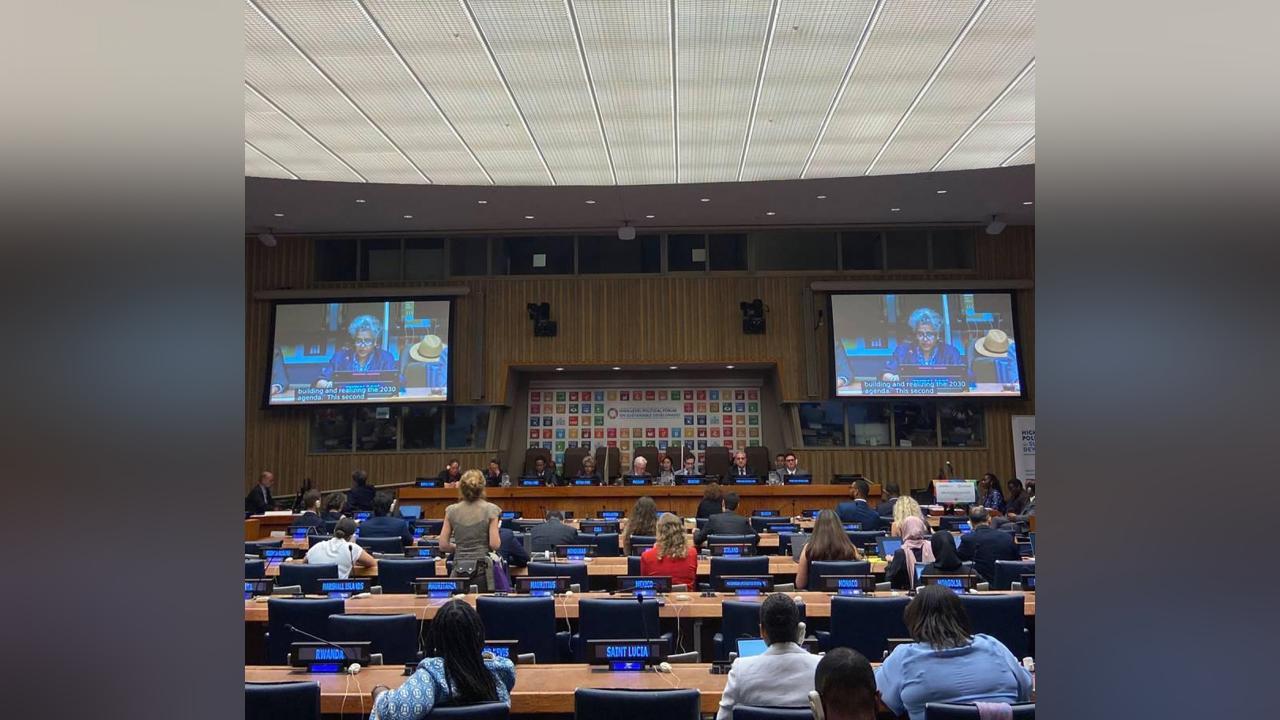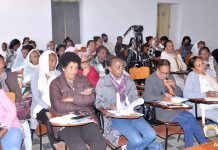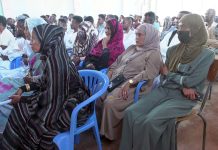Africa-Press – Eritrea. This is the third article in a multi-part series that sheds light on Eritrea’s participation at the 2024 High-Level Political Forum and the country’s second Voluntary National Review of progress towards Agenda 2030 and the Sustainable Development Goals. It provides a small snapshot of the third major section of Eritrea’s report, which traces the country’s progress on one of the most important areas for development: education.
Education is one of the pillars of Eritrea’s nation-building and development framework, with the country working hard to expand access nationwide and establish critical infrastructure. Within both urban and rural areas, hundreds of new schools, learning centers, and libraries have been built, as older ones have been markedly renovated or upgraded. The number of schools at all levels has multiplied from just over 500 in 1991 to 1,930 in 2015 and to 2,351 last year, with many more currently under planning or in the process of being constructed. Accordingly, enrolments at the primary, middle, and secondary levels have increased from 353,859, 141,746, and 87,664 to 398,090, 176,162, and 88,984, respectively. At the tertiary level, between 2016/17 and 2023/24, enrolment within degree programs increased by almost 89 percent from 1,672 to 3,155, while enrolments in diploma programs have ranged from between 1,000-2,000 annually.
Parallel to these advances, the number of qualified teachers has been increased at all levels, and significant progress has been registered with regard to literacy. It is estimated that in 1990, on the verge of Eritrea’s independence, the adult literacy rate in the country was 46 percent, with male literacy standing at 59 percent and female literacy at 35 percent. By 2018, adult literacy had improved to about 77 percent, with male literacy moving to 84 percent and female literacy increasing to 69 percent. During the same period, even steeper increases were achieved in youth literacy, indicating that the country’s efforts to strengthen the supply and quality of basic education programs have largely been successful. In 1990, youth literacy was about 61 percent, with male literacy at 73 percent and female literacy lagging behind at 49 percent. However, in 2018, youth literacy had climbed to approximately 93 percent, with male literacy rising to 94 percent and female literacy jumping to 93 percent.
The United Nations Educational, Scientific, and Cultural Organization’s (UNESCO) Institute for Statistics states that Eritrea has achieved one of the largest increases in youth literacy anywhere in the world over the past 50 years.
Expanding opportunities and providing youth with a viable avenue towards sustainable livelihoods.
An increasingly important area of focus for Eritrea has been technical and vocational education and training (TVET). The country has established several TVET institutions, with students enrolling following the completion of the tenth grade. At present, there are seven institutions providing TVET in different fields and areas, including electronics, carpentry, drafting, auto mechanics, agriculture, and music, among others. TVET has provided a great platform for young people with varied interests or who aspire to learn but may experience challenges with traditional academic programs. Ultimately, it has helped to expand opportunities and provide youths with a viable avenue towards employment and sustainable livelihoods.
In total, since 2015, more than 10,000 students in 20 fields of study have graduated from TVET institutions. Overall, female enrolments have stood at about 46 percent. Importantly, the Ministry of Education (MoE) has developed short- and medium-term plans to increase enrolments through expanding the capacity of existing institutions, constructing new ones, and facilitating the provision of evening courses.
Alongside programs delivered by formal TVET institutions, many government ministries, as well as a variety of national organizations, such as the National Confederation of Eritrea Workers (NCEW), the National Union of Eritrean Youth and Students (NUEYS), the National Union of Eritrean Women (NUEW), the Ministry of Land, Water and Environment (MLWE), and the Ministry of Labor and Social Welfare (MLSW), provide short-term technical and vocational training or courses. These initiatives, delivered free-of-charge for all participants and focused on the development of skills and competencies within a variety of fields, strengthen human capital formation while sustainably and efficiently supporting employment and productivity.
Last year, the MLSW trained more than 400 employees, focusing on enhancing their employment opportunities and ensuring a skilled labor force, while the MLWE trained nearly 900 individuals, emphasizing the importance of environmental sustainability and the development of a green economy. As well, the NUEYS trained nearly 1,400 individuals, fostering the next generation of skilled professionals and leaders in the country, the NCEW provided vocational training to almost 3,600 individuals, promoting labor rights and enhancing workers’ capacity to contribute to the economy, and the NUEW trained just under 500 young women, promoting their empowerment and active participation in the workforce.
Encouraging early childhood education and development
For Eritrea, pre-primary education has become integral to the country’s efforts to advance the rights of children, alleviate poverty and reduce inequality, and promote inclusive sustainable development. The country’s policy for early childhood care and education, first developed in 2010 and under continuous review, provides early learning development standards for young children (aged between 4 – 6 years). Importantly, it recognizes the value and importance of parents, caregivers, and the community, encouraging their active engagement and participation in all aspects of child education.
The official age of entry for pre-primary education in Eritrea is 4 years. Pre-primary is provided in a comprehensive and integrated learning program that extends for 2 years. Pre-primary can take one of 2 forms: formal kindergartens and non-formal community care-giving centers or rural community children’s centers. In total, the number of formal pre-primary schools in the country has increased from 483 in 2012/13 to 506 in 2015/16 and 709 in 2022/2023.
Working to ensure opportunities for all
In Eritrea, education is regarded as an essential element for inclusive, sustainable development, a central pillar of society, and a fundamental right to which all individuals are entitled. National policy provides for access to education free-of-charge to all Eritreans, extending from the primary to the tertiary level, while basic education until the eighth grade is compulsory by law.
The Eritrean government has continued to make considerable efforts to enhance the participation of girls in education. This includes the enactment and enforcement of strong legislation prohibiting child, underage, and forced marriage, harmful practices which historically have disproportionately impacted girls, as well as the construction of gender-segregated toilet and latrines, the development of community-based communication and sensitization programs, and the establishment of boarding and para-boarding schools.
In recognition of the differing life conditions and experiences of women and girls, and seeking to redress past inequities and historical disadvantages or discrimination, progressive and affirmative action measures have been developed within higher education to increase enrolments, strengthen retention and promote completion, and raise overall levels of performance and achievement. Additionally, in several parts of the country, the NUEW and NUEYS have organized tutorial programs and other educational support initiatives, delivered free-of-charge for students, to enhance and improve the participation and achievement of girls within middle and secondary schools.
Across all levels, female enrolment continues to steadily grow and the historically huge gender gap is being progressively narrowed. Parity between girls and boys has been achieved within middle education and it is almost fully achieved in pre-primary, secondary, and tertiary education.
Eritrea has also devised and implemented a broad array of other programs and measures that aim to comprehensively promote inclusion and equal opportunities for all. These include the provision of highly subsidized and free learning materials for those in need, financial and material assistance to vulnerable households to keep children enrolled in and attending school, adult extension and outreach learning programs, and literacy and skills programs for the incarcerated. The mother language policy, which mandates multilingual education based on the mother language from pre-primary until the end of elementary level, developed by the MoE, has not only played a key role in preserving heritage and culture, it has meant more equitable access for all ethnolinguistic groups and greater enrolment, retention, and comprehension.
Additionally, selected schools in some parts of the country offer regular meals to students, an important social protection tool that leads to multiple health and learning benefits. With the expansion of
the national roads network, public transportation services have been greatly improved, helping to ease travel and attendance for students. As well, in remote regions characterized by difficult terrain, the government has provided donkeys to many youths living with disabilities to help them reach school, while bicycles have been extended to other students that must walk considerable distances.
Nomadic populations and other hard-to-reach groups have also received opportunities to learn, the majority for the first time, through the establishment of boarding facilities and mobile schools in remote areas. Through close cooperation with elders and community leaders, the MoE has developed special academic schedules that are specifically tailored to align with nomadic groups’ lifestyles and migratory patterns.
There are also formal education services for children with disabilities, such as the vision and hearing impaired, while efforts also continue to be made to integrate children with developmental disabilities into mainstream schools, through the creation of special classrooms.
For More News And Analysis About Eritrea Follow Africa-Press







